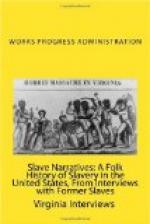“When the slaves got sick, they’d take and look after themselves. My master had a whole wall of his house for medicine, just like a store. They made their own medicines and pills. My mistress’s brother, Dr. Jim Taylor, was a doctor. They done their own doctoring. I still have the mark where I was vaccinated by my master.
“People was lousy in them days. I always had to pick louses from the heads of the white children. You don’t find children like that nowadays.
“My mistress had a little roan horse. She went all through the war on that horse. Us little kids never went around the big folks. We didn’t watch folks faces to learn, like children do now. They wouldn’t let us. All I know about the Civil War was that it was goin’ on. I heard talk about killin’ and so on, but I didn’t know no thin’ about it.
“My mother was the last slave to get off the plantation. She travelled across the plantation all night with us children. It was pouring rain. The white folks surrounded her and took away us children, and gave her so many minutes to get off the plantation. We never saw her again. She died away from us.
“My brother came to see us once when slavery was over. He was grown up. My master wasn’t going to let him see us and he took up his gun. My mistress said he should let him see us. My brother gave me a little coral ring. I thought it was the prettiest thing I ever saw.
“I made my sister leave. I took a rolling pin to make her go and she finally left. They didn’t have any more business with us than you have right now.
“I remember when Yankee soldiers came riding through the yard. I was scared and ran away crying. I can see them now. Their swords hung at their sides and their horses walked proud, as if they walked on their hind legs. The master was in the field trying to hide his money and guns and things. The soldiers said, ‘We won’t hurt you, child.’ It made me feel wonderful.
“What I call the Ku Klux were those people who met at night and if they heard anybody saying you was free, they would take you out at night and whip you. They were the plantation owners. I never saw them ride, but I heard about them and what they did. My master used to tell us he wished he knew who the Ku Kluxers were. But he knew, all right, I used to wait on table and I heard them talking. ‘Gonna lynch another nigger tonight!’
“The slaves tried to get schools, but they didn’t get any. Finally they started a few schools in little log cabins. But we children, my sister and I, never went to school.
“I married William L. Davison, when I was thirty-two years old. That was after I left the plantation. I never had company there. I had to work. I have only one grandchild still living, Willa May Reynolds. She taught school in City Grove, Tennessee. She’s married now.
“I thought Abe Lincoln was a great man. What little I know about him, I always thought he was a great man. He did a lot of good.




